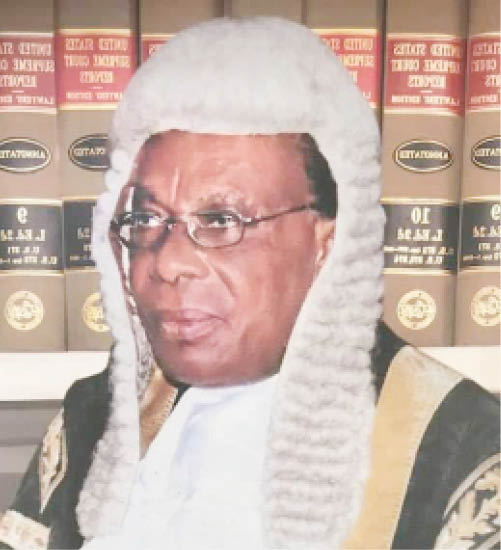Ag CJN, others remember Justice Chukwuma-Eneh’s landmark verdicts
The acting Chief Justice of Nigeria (CJN), Justice Tanko Muhammad, and other justices, lawyers and political leaders, last week, extolled the qualities of a late Justice of the Supreme Court, Christopher Mitchell Chukwuma-Eneh, who died on February 27, 2019, at the age of 74. The profundity of Justice Chukwuma-Eneh’s understanding of law can be gleaned […]

Justice Christopher Chukwuma-Eneh
The acting Chief Justice of Nigeria (CJN), Justice Tanko Muhammad, and other justices, lawyers and political leaders, last week, extolled the qualities of a late Justice of the Supreme Court, Christopher Mitchell Chukwuma-Eneh, who died on February 27, 2019, at the age of 74.
The profundity of Justice Chukwuma-Eneh’s understanding of law can be gleaned from the judgements and pronouncements he made throughout his service on the bench.
Among the major pronouncements is the one on the status of the National Industrial Court (NIC) in the judicial hierarchy in the case: National Union of Electricity Employees vs Bureau of Public Enterprises (2010) 7 NWLR (Pt. 1194) p. 538 at p.572, where he said:
“It means, therefore, that by Decree No. 47 of 1992 arrogating the National Industrial Court a superior court of record as has been contended by the appellant does not by that token make the said National Industrial Court a superior court of record without an amendment of the provisions of Section 6 (3) and (5) of the 1999 Constitution and the list does not include the National Industrial Court; until the constitution is amended it remains a subordinate court to the High Court.”
Justice Chukwuma-Eneh made strong pronouncement on the privileges of a mortgagor and mortgagee in property disputes. It was in the case of Yaro vs Arewa Construction Ltd. (In Receivership) (2007) 17 NWLR (Pt. 1063) p. 333. This saved many financial institutions in the hands of unscrupulous mortgagors.
In the case of whether a judge can have recourse in any provision of law in the course of writing judgment in Bakare vs Nigerian Railway Corporation (2007) 17 NWLR (Pt. 1064) p. 606, Justice Chukwuma-Eneh also ruled on what must be shown where the Supreme Court is invited to overrule its previous decision.
There was also the issue of presumption of a retraction of a confessional statement where the voluntariness is challenged in Oged Ovunwo and anor v Iheanyichukwu Woko & ors (2011) LPELR-2841 (SC); Augustine Ibeme v. The State (2013) LPELR-20138 (SC).
The acting Chief Justice of Nigeria, Tanko Muhammad, led the eulogies for Justice Chukwuma-Eneh at the valedictory session organised for him at the Supreme Court in Abuja.
Justice Muhammad noted that he was appointed to the Supreme Court bench alongside the late jurist on January 8, 2007, and remained in “brotherly and professional affinity.”
“As a Justice of the Supreme Court of Nigeria for about seven years, he handled several cases and delivered judgments that have literally broadened the horizon of the Nigerian judiciary. He had remarkably invested his rich intellectual resource in the Nigerian project; particularly, the growth of the judiciary. Of particular interest is his reputation for paying attention to details and having robust affinity with excellence and scholarship,” he said.
“As it is today in the Nigerian judiciary, we see Justice Eneh as a jewel of inestimable value, a great lion in the temple of justice whose roar will keep resonating in the courtrooms in Nigeria and beyond,” he added.
Paying his last respects to the late jurist, the Attorney General of the Federation (AGF) and Minister of Justice, Abubakar Malami (SAN), described the late justice as “a man of extraordinary vigour, of pre-eminence, goodness and wisdom…a legal scholar and seasoned jurist” who touched lives and contributed to the development of the judiciary.
A representative of the Body of Benchers, Ofodile Okafor (SAN), charged judges to leave positive legacies for posterity like Justice Chukwuma-Eneh whose judgements would stand out for generations.
The President of the Nigerian Bar Association (NBA), Paul Usoro (SAN), described Justice Chukwuma-Eneh as “an eminent and prolific jurist who shaped the polity of the nation through his resounding pronouncements and judgments.”
Deputy Senate President, Ike Ekweremadu, who was on hand to pay respect, said Justice Chukwuma-Eneh would be missed by the Udi community and the entire senatorial district for his humanitarian service and leadership in community and church positions.
He said effort would be made to immortalise him.
Justice Chukwuma-Eneh was born on April 23, 1944, to the family of Pa Wilfred Eneh and Mrs. Margaret Nnokwo (Nee Ugwu Igwenshi) in Udi Local Government Area of Enugu State.
He had early education in some of the best schools around then Eastern Nigeria before obtaining an LL.B in 1965 from the University College, London (UCL). From the same school, he obtained an LLM and was subsequently called to the English Bar in 1970 where he won the Montague Prizeman of the Middle Temple.
On his return to Nigeria, he enrolled at the Nigerian Law School, Lagos, in 1974. He began to practice at the law firm of Chief Enechi Onyia (SAN) before he joined the chambers of Justice Augustine Nnamani and became the head of chamber upon the appointment of Justice Nnamani as the AGF.
Due to his competence, he was appointed judge of the High Court of old Anambra State in 1989. In 1998, he was elevated to the Court of Appeal where he served in Jos, Lagos and Calabar.
He climbed to the Supreme Court in 2007 from where he retired in 2014.
He received the National Merit Award for his service to the nation, including the Commander of the Order of the Niger (CON) in 2007 from President Shehu Musa Yar’Adua and the Commander of the Order of the Federal Republic (CFR) by President Gooduck Jonathan in 2016.
